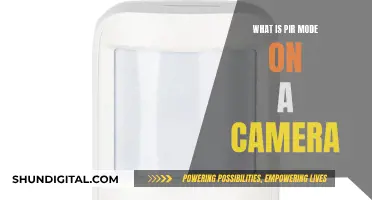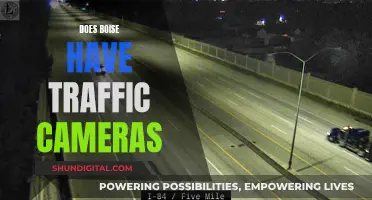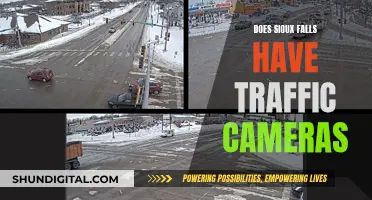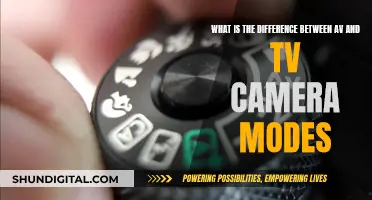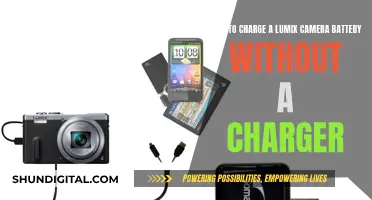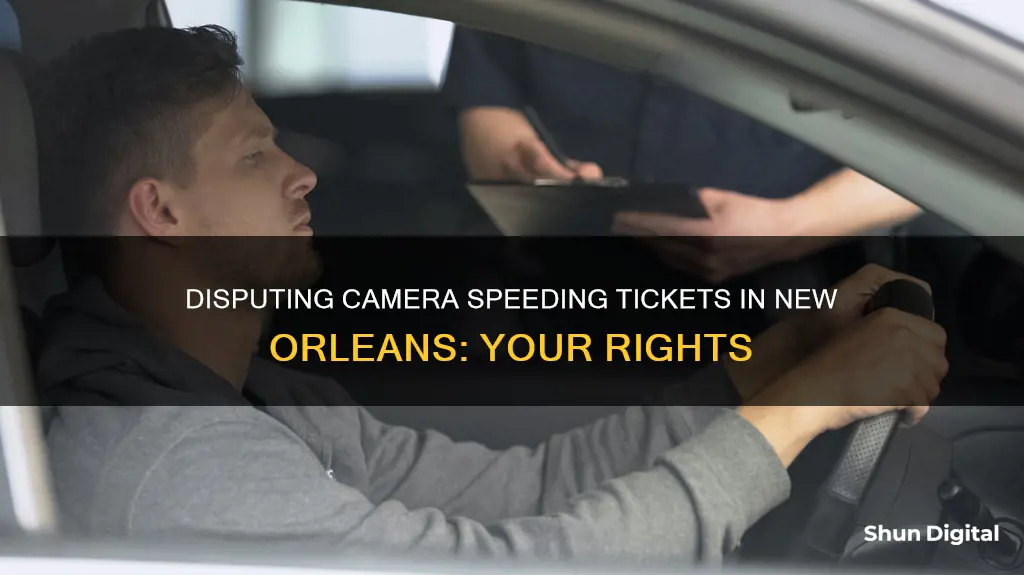
If you've received a speeding ticket in New Orleans, you may be wondering how to dispute it. While it's always best to follow the rules and stay within the speed limit, sometimes tickets are issued unfairly or in error. Here are some steps you can take to dispute a speeding ticket from a camera in New Orleans. Firstly, examine your ticket and check the date, time, and location. Confirm whether you were actually driving the car at the time of the violation, as tickets are sent to the owner of the vehicle, not the driver. If someone else was driving, you cannot be prosecuted. Next, identify the code section you're cited for violating and research the associated law to understand the elements and penalties of the violation. Review any photos included with the ticket to ensure the vehicle is identifiable, as blurry photos can be challenged. You can plead not guilty by mail, online, or in person, depending on the jurisdiction. If you plead not guilty, a formal hearing will be scheduled. You can request documents such as maintenance records for the camera and traffic light system to establish their accuracy. Finally, present your defense at the hearing, challenging the admissibility of the photographs and asserting your right to confront witnesses. It's important to note that disputing a camera speeding ticket can be challenging, and you may choose to seek legal advice or representation.
| Characteristics | Values |
|---|---|
| Ticket Issuing Authority | Council of the City of New Orleans |
| Ticket Type | Automated Traffic Enforcement System |
| Ticket Violation | Traffic signal and speed limit violations |
| Ticket Amount | $105 fine + $30 administrative fee = $135 total |
| Late Payment Penalty | $75 |
| Dispute Address | Mentioned on the ticket |
| Dispute Method | Mail a dispute letter |
| Dispute Time | Within 30 days of the issuance of the ticket |
What You'll Learn

Plead not guilty and request a hearing
If you want to dispute a camera speeding ticket in New Orleans, you must plead not guilty and request a hearing. This is how you do it:
Plead Not Guilty
Firstly, you must plead not guilty by the deadline stated on your citation. This is usually within 30 days of receiving the ticket, but check your citation to be sure. You can plead by mail, online, or in person at an arraignment—also known as a first appearance or notice hearing. If you plead not guilty, you cannot also pay the fine listed; this is considered an admission of guilt in some jurisdictions.
Request a Hearing
When you plead not guilty, you should also request a full formal hearing or trial. This may require you to attend other hearings, such as a pre-trial hearing or mediation, but don't accept anything less than a full dismissal of your ticket. You will then receive a notification of the date, time, and location of your scheduled hearing.
Charging Camera Batteries: Universal Charger Usage
You may want to see also

Argue that the camera can't prove who was driving
If you've received a speeding ticket in New Orleans, it's important to remember that these tickets are issued to the owner of the vehicle, not the driver. This means that if someone else was driving your car, you may not be held responsible for the violation. However, it is your responsibility to provide the details of the person driving at the time of the offence.
When disputing a speeding ticket, you can argue that the camera cannot prove who was driving. Here are some steps you can take:
- Examine your ticket: Check the date, time, and location of the violation. If you weren't driving your car at that time, you may not be liable for the ticket.
- Plead not guilty: Respond to the citation by mail, online, or in person by pleading not guilty. Do not pay the fine, as it may be considered an admission of guilt.
- Request a formal hearing: When you plead not guilty, demand a full formal hearing or trial. This may include attending other hearings such as pre-trial hearings or mediation.
- Request documentation: Call the local police department or law enforcement agency to request copies of any photos or videos taken by the camera. You can also request maintenance records for the camera and speed monitoring system to establish that they were properly maintained and calibrated.
- Research applicable laws: Look for cases in your area regarding traffic cameras and speeding tickets. There may be specific rules or defences that you can use, such as the requirement for warning signs or a necessity defence for speeding.
- Challenge the evidence: If the photos or videos are unclear or do not show the driver's face, you can argue that the prosecution cannot prove who was driving. You can also dispute the authenticity and admissibility of the photographs as evidence.
Remember that fighting a speeding ticket can be challenging and may require legal expertise. It is important to carefully review the details of your case and seek legal advice if needed.
Charging Your Coolpix Camera: A Step-by-Step Guide
You may want to see also

Reference your right to face your accuser
When disputing a camera speeding ticket in New Orleans, it is important to know your rights. One of your key rights is the right to face your accuser. This right can be referenced strategically when disputing a camera ticket. Here are some detailed instructions and considerations to help you exercise this right effectively:
Understanding the Nature of the Accusation
Firstly, it is important to understand the nature of the accusation. In the case of a camera speeding ticket, the accuser may be interpreted as either the camera itself or the officer reviewing the footage and photos. If the accusation is made by the camera, this can be challenged as absurd. If the accusation is made by the reviewing officer, it is essential to question the accuracy and reliability of the camera footage they are using to accuse you.
Questioning the Evidence and Officer's Testimony
You have the right to question the evidence presented against you during the hearing. Challenge the accuracy and reliability of the camera footage by raising doubts about various factors. For example, you can inquire about the software being up to date, whether the camera was pointing at the correct lane, and the accuracy of the date and time stamp. Requesting the officer to confirm the identity of the person they are accusing is also a valid line of questioning.
Burden of Proof
It is important to understand that the burden of proof lies with the prosecution. They must prove your guilt beyond a reasonable doubt. If there is any reasonable doubt raised during the hearing, you should be absolved of the charge. Emphasize that the state has the responsibility to confirm the identity of the accused and provide clear evidence of a traffic violation.
Exercising Your Right to Silence
Remember that you have the right to remain silent during the process. You are not obligated to provide self-incriminating statements or incriminate anyone else. Your focus should be on questioning the evidence and testimony presented against you, rather than providing additional information that may weaken your case.
Seeking Legal Advice
While camera speeding tickets can be disputed without legal representation, it is advisable to consult or hire a traffic attorney, especially if you intend to exercise your right to face your accuser effectively. An experienced attorney can guide you through the legal process, help you navigate your rights, and improve your chances of a successful dispute.
Traffic Camera Tickets: Legal in Newburgh Heights, Ohio?
You may want to see also

Request camera and speed detection equipment maintenance records
If you want to dispute a speeding ticket in New Orleans, you must first plead not guilty by mail, online, or in person at an arraignment. Then, you can request a formal hearing. During this process, you can request production of documents, including full maintenance records for the camera and the traffic light or speed monitoring system. This is to establish that they were regularly monitored, maintained, and calibrated. If their accuracy wasn't tested within a short period before your ticket was issued, any photo evidence may be unreliable.
Step 1: Identify the Relevant Authorities
First, identify the local police department or law enforcement agency responsible for the camera that issued your citation. This information may be included with your citation or available through a quick online search.
Step 2: Make a Formal Request
Contact the relevant law enforcement agency and make a formal request for the maintenance records. You can do this by calling, emailing, or writing a letter. Be sure to include your citation number and any other relevant information in your request.
Step 3: Understand Your Rights
Know that you have the right to request and obtain these maintenance records as part of the evidence in your case. The law enforcement agency should provide you with the records or inform you of the procedure to access them.
Step 4: Follow Up
If you do not receive a response or the records in a timely manner, follow up with the law enforcement agency. There may be specific deadlines for providing this information, which can vary by jurisdiction.
Step 5: Review the Records
Once you receive the maintenance records, review them carefully. Look for any signs of improper maintenance, calibration issues, or other technical problems that could impact the accuracy of the camera and speed detection equipment.
Step 6: Build Your Defense
If you find any discrepancies or issues in the maintenance records, you can use this information to build your defense. Consult with a legal professional to determine the best course of action and how to incorporate this evidence into your hearing or trial.
Obtaining camera and speed detection equipment maintenance records is a crucial step in disputing a speeding ticket. It allows you to verify the accuracy of the equipment and challenge the evidence presented against you. Remember to be diligent in your requests and follow-up, and don't be afraid to assert your rights as a defendant.
The Evolution of Disc Camera: A Historical Perspective
You may want to see also

Argue that the photo is inadmissible as evidence
If you've received a speeding ticket in New Orleans, it's important to understand your options for disputing it. Contesting a traffic camera ticket can be challenging, but it's not impossible. Here are some tips to help you argue that the photo or video evidence from the camera is inadmissible:
Firstly, understand the nature of the evidence. The City of New Orleans has implemented an Automated Traffic Enforcement System that uses state-of-the-art digital cameras and violation detection systems at intersections to capture speed limit violations. These cameras are activated by sensors and take two digital photos or a video clip to document the violation. The images or video clips are available online for review.
Now, to dispute the photo or video evidence, you can question its accuracy and reliability. Here are some strategies to do so:
- Check the clarity and legibility of the photo or video: If the image is blurry or pixelated, you can argue that it does not clearly show your vehicle or the alleged violation.
- Challenge the calibration and maintenance of the camera: Request information on the calibration and maintenance records of the camera in question. If there are any discrepancies or issues, you can argue that the camera may not have been functioning properly at the time of the alleged violation.
- Raise concerns about the chain of custody: Inquire about who had access to the photo or video evidence and whether there are any potential issues with how it was handled, stored, or transferred. Any breaks in the chain of custody could cast doubt on the integrity of the evidence.
- Dispute the time and date of the photo or video: Compare the timestamp on the evidence with any records you may have of your whereabouts at that specific time. If you can provide an alibi or prove that your vehicle was elsewhere, it could call into question the accuracy of the photo or video.
- Look for editing or manipulation: Examine the photo or video closely for any signs of digital manipulation or editing. If there are discrepancies or inconsistencies, you can argue that the evidence may have been altered and is therefore unreliable.
Remember, when disputing a speeding ticket, it is your right to question the evidence presented against you. By carefully examining the photo or video evidence and raising valid concerns about its admissibility, you may be able to successfully dispute the speeding ticket. However, always seek legal advice if necessary, as each case is unique.
Mastering Camera Mode: Stop Fighting, Start Clicking
You may want to see also
Frequently asked questions
To dispute a camera speeding ticket in New Orleans, you can start by examining your ticket and the associated photos/videos. You have the right to request and review this evidence before your hearing. Check the date, time, location, and any other relevant details. If there is reasonable doubt that you or your vehicle were involved, this can be grounds for dismissal. You can then plead not guilty by mail, online, or in person, and request a formal hearing.
If you are found guilty, you will be required to pay the associated fine and any additional administrative fees or penalties. However, if your case is dismissed, you may be entitled to a refund of any fees previously paid. In some cases, you may be able to reach a settlement before the hearing, resulting in a reduced fine.
One defence is to argue that the prosecution cannot prove beyond a reasonable doubt that you were driving the vehicle at the time of the violation. Additionally, you can question the accuracy and reliability of the camera equipment by requesting maintenance records and challenging the admissibility of the photographs as hearsay. You can also research and reference specific laws or requirements that may not have been followed, such as the placement of warning signs or the need for flashing beacons in school zones.
The cost of a camera speeding ticket in New Orleans varies depending on how many miles per hour you were travelling over the speed limit. Fines range from $75 for speeding 1-9 mph over the limit to $235 for speeding more than 20 mph over the limit. There is also an additional administrative fee of $30, and late payment penalties may apply if you do not pay on time.
Failing to pay a camera speeding ticket or respond to the Delinquent Notice within 30 days will result in the matter being submitted to a professional collection agency. This can impact your credit score and may lead to additional penalties and fees. While it is not a criminal offence, ignoring a camera speeding ticket can result in significant financial consequences.



